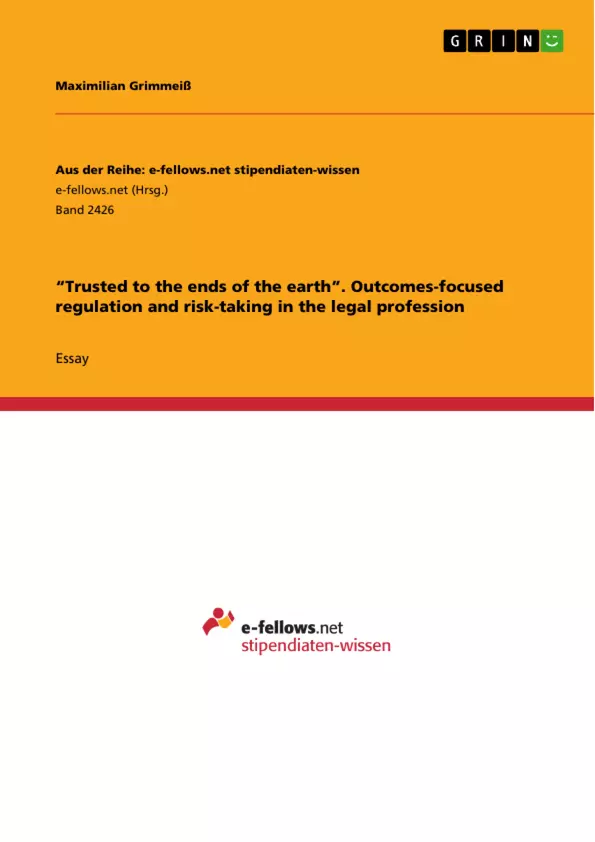Lawyers “may be trusted to the ends of the earth”. This statement might not reflect the public opinion anymore. The scandals around lawyers and their legal opinions in the wake of the financial crisis and the publication of the ‘Panama Papers’ raised the questions, if lawyers satisfy their clients ignoring risks and whether outcomes-focused regulation allows these risks to be ignored due to its wide scope.
To answer these questions, this essay will first explain the role of the lawyer to satisfy clients' needs (2.) with regard to the limitations of satisfying the clients' needs (3.) and the risks involved with the dissatisfaction and satisfaction of clients' needs (4.). Following on from these risks, the essay will look at the definition of outcomes-focused regulation and its aim (5.) and whether this approach allows ignoring the risks (6.).
This assessment will focus in particular on the guidance to transactions lawyers in commercial practise. For this purpose a transaction lawyer is a solicitor who gives legal advice on a transaction, but does not conduct advocacy.
Inhaltsverzeichnis (Table of Contents)
- Introduction
- The job of a lawyer to satisfy clients' needs
- Satisfaction above all else
- Risks of dissatisfaction and satisfaction
- Definition and aim of outcomes-focused regulation
- Ignoring risks and guidance on outcomes-focused regulation
- Primary legislation
- Regulations
- SRA Code of Conduct
- Turning to secondary sources
- Conclusion
Zielsetzung und Themenschwerpunkte (Objectives and Key Themes)
This essay aims to explore the relationship between lawyers' duty to satisfy clients' needs and the principles of outcomes-focused regulation in the legal profession. It examines the potential risks associated with both satisfying and failing to satisfy client demands, particularly in the context of commercial transactions.
- The role of lawyers in meeting client needs within the framework of professional ethics and regulation.
- The potential conflicts between satisfying client needs and upholding ethical and legal obligations.
- The impact of outcomes-focused regulation on lawyers' decision-making and risk management.
- The balance between client satisfaction and protecting the public interest and the rule of law.
- The risks associated with excessive focus on client satisfaction and potential consequences for professional integrity.
Zusammenfassung der Kapitel (Chapter Summaries)
- Introduction: Introduces the central theme of the essay by exploring the challenges facing lawyers in balancing client satisfaction with ethical and regulatory requirements, particularly in light of recent scandals.
- The job of a lawyer to satisfy clients' needs: Examines the contractual and regulatory perspectives on lawyers' obligations to fulfill client needs, highlighting the prominence of this duty within the Solicitors Regulation Authority (SRA) Code of Conduct.
- Satisfaction above all else: Discusses the limits of client satisfaction, acknowledging the supremacy of legal and ethical obligations, such as compliance with the law and safeguarding the public interest.
- Risks of dissatisfaction and satisfaction: Analyzes the potential risks associated with both failing to meet client expectations and blindly following their demands, emphasizing the importance of maintaining professional independence and ethical standards.
- Definition and aim of outcomes-focused regulation: Introduces the concept of outcomes-focused regulation and its intended purpose in regulating the legal profession, focusing on its impact on the decision-making and risk management practices of transaction lawyers.
- Ignoring risks and guidance on outcomes-focused regulation: Explores the potential for outcomes-focused regulation to lead to the neglect of risks, examining the guidance provided by primary legislation, regulations, the SRA Code of Conduct, and secondary sources to address these concerns.
Schlüsselwörter (Keywords)
Key terms and concepts central to this essay include: client satisfaction, outcomes-focused regulation, professional ethics, risk management, transaction lawyers, SRA Code of Conduct, legal obligations, public interest, rule of law, professional independence, and client trust.
Frequently Asked Questions
What is outcomes-focused regulation (OFR) in the legal profession?
OFR is a regulatory approach that focuses on high-level principles and desired results (outcomes) rather than strict, detailed rules for every situation.
Does OFR allow lawyers to ignore professional risks?
The essay investigates this concern, questioning if the broad scope of OFR might lead lawyers to prioritize client satisfaction over ethical and regulatory risks.
What are the risks of over-prioritizing client satisfaction?
Risks include potential ethical breaches, loss of professional independence, and damage to the public interest or the rule of law.
What is the role of the SRA Code of Conduct in this context?
The Solicitors Regulation Authority (SRA) provides the framework that balances the duty to the client with the duty to uphold the law and professional standards.
How do transaction lawyers manage risks under OFR?
They must use professional judgment to ensure that the outcome of a transaction complies with regulatory principles while meeting the client's needs.
- Arbeit zitieren
- Maximilian Grimmeiß (Autor:in), 2016, “Trusted to the ends of the earth”. Outcomes-focused regulation and risk-taking in the legal profession, München, GRIN Verlag, https://www.grin.com/document/370671



